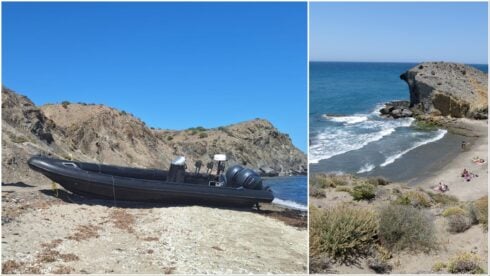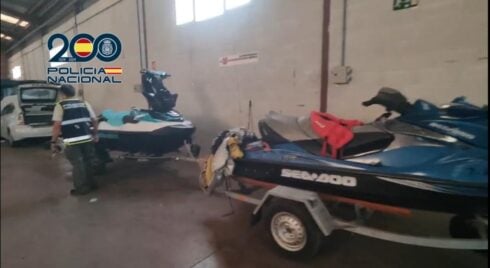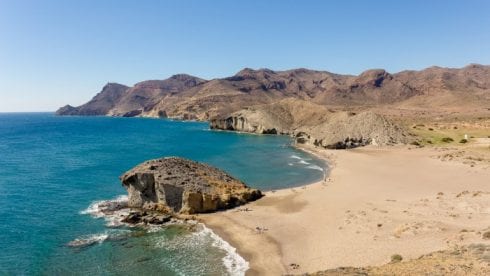Words and pictures by Conor McGlone
We have struggled to get the fire going. Lotte and boyfriend Jonas have brought their offerings for dinner: a manioc, sweet potatoes, more firewood. The full moon lights up the cliffs behind us, painting them an outrageous bright white. The silhouettes of palm trees and the dark shape of a ruined castle remind us where we are when we draw our gaze from the flames.
This is San Pedro beach – a small settlement on a remote stretch of coast near Almeria, southern Spain. The people living here don’t for the most part bother with clothes. Or rules.
There’s no need; its warm, still in October and people here want to unplug. There are a handful of semi-permanent structures, some built from wood, some cob, dotted up the hillside, powered by strategically placed solar panels and small wind turbines. Tie-dyed sarongs and baggy ponchos flutter like flags from clothes lines. A fresh spring to drink from, and to wash in, threads its way down through the makeshift dwellings. You can pitch yout tent up wherever you want. “Just take your rubbish with you,” a sign says. City life, deadlines, technology, seem a world away.
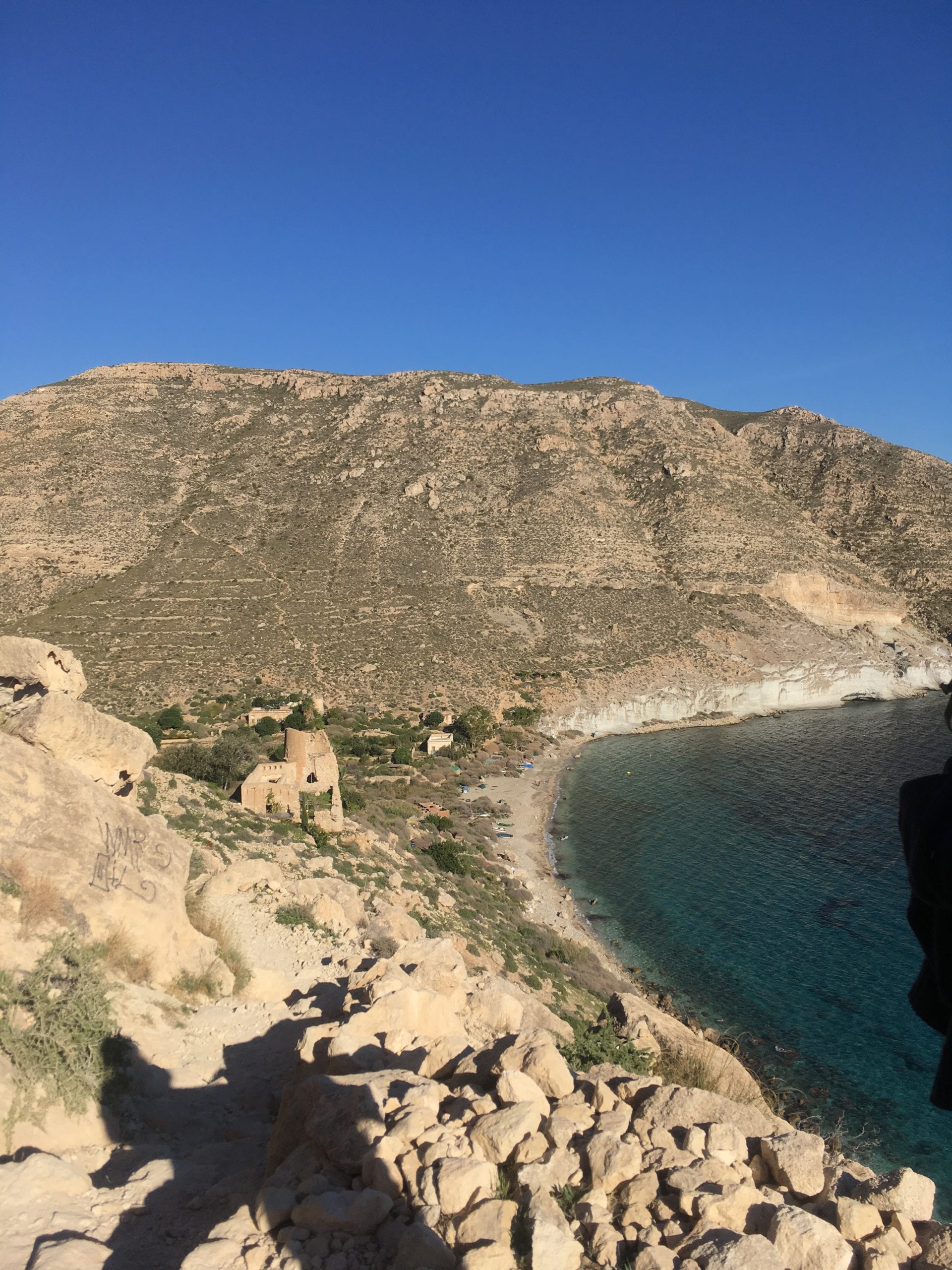
By day the water in the bay, calm this time of year, is an inviting blue but it belies a dangerous truth. It is infested with thousands of purple jellyfish. They are known as medusas fuegas to the locals or ‘fire jellyfish’. “They can leave really bad scars and if you get stung multiple times out there you can be in trouble,”the dreadlocked proprietor of one of the beach’s two bar shacks had told me.
A wizened, short, 40-year-old, smoking through missing front teeth
By night however, the sea is just a sound, a presence. Our dinner setting, a few metres above the beach where we are camped, surrounded by reeds and palms, feels removed from the distant roar of the mighty Mediterranean. Only our most immediate concerns – things in reach – are visible; a spoon, a plate, a lighter. Beyond the flickering flames, things are indistinct, indeterminate and for now, another world.
READ MORE:
- FOREIGNER: The Spanish film about a British tourist, an expat and a boat full of illegal migrants, is up for a Goya award
- Migrant boat capsizes en route to Spain with 58 people drowned and 40 more feared dead
We talk about being off-grid, disconnecting from the world, the evil of TV and smart-phones, the addiction of consumerism. We speak about First World guilt, the fallacy of capitalism. We talk about dropping out, tuning in. We talk about plastic pollution, globalisation; the damage we are doing to the world.
We offer up few solutions but enjoy the gentle, familiar grumblings. There is a faint hint of flamenco carried on the breeze. Cicadas sing. Snatches of French conversations drift to us from the tents above us. In the mix we detect Arabic voices and we begin reminiscing over our travels to the Middle East, the romance of the call to prayer, the bustle of the bazaars.
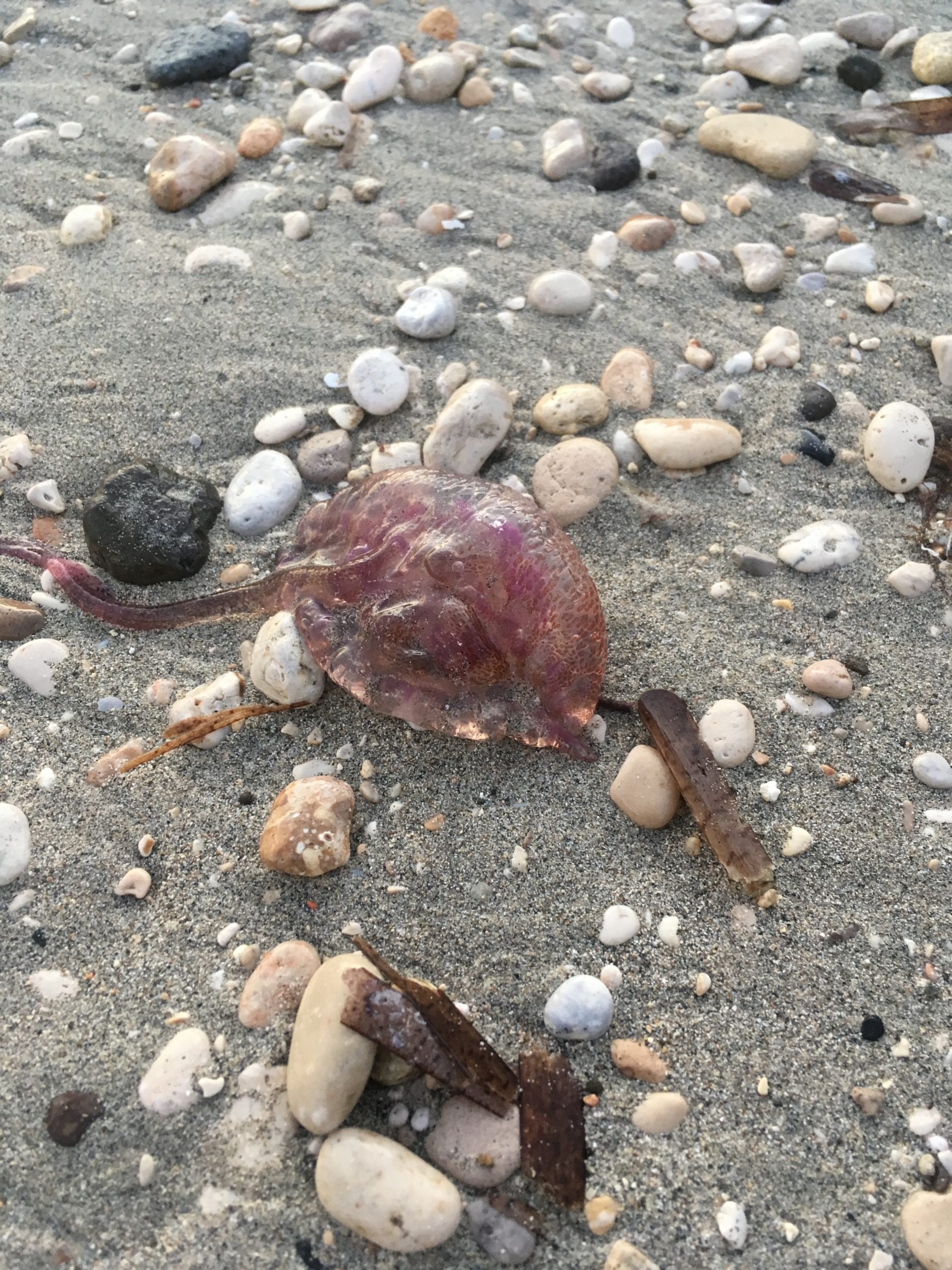
Sometime later these same voices arrive again, followed shortly by the outlines of their owners – six men – framed in the firelight at the opening to our pitch. They are smiling and we smile back exchanging greetings: “As-Salamu Alaikum…wa alaykumu s-salam.”
The youngest, Ahmed, about sixteen, has fashionable spectacles and a footballer’s haircut, short back and sides, bleached white at the tips. The oldest is a wizened, short, 40-year-old, smoking through missing front teeth. They all have a pumped-up intensity about their eyes.
“Where are you from?” they ask in French.
Lotte and Jonas, who are Swiss, take on the role of interpreters.
“You are not French?”
“No we are Swiss they are English.”
“We are from Algeria, Algiers.”
“Have you been here long?”
“A few nights, we reply, how about you?”
“We have just arrived.”
“Nous sommes tres fatigues,do you have water? Where is the road?“
We pass them bottles, which they guzzle down.
“I can show you the way to the road,” says Jonas. “It’s about an hour up and over the cliffs,” he points. “But you should stay with us. The moon may be bright but it is late and there is plenty of room here.”
There’s something going on here; I haven’t quite put my finger on it.
“Where have you walked from?” I ask them. “When did you arrive in Spain?”
“Maintenant“, one of them pants, the moon accentuating the excitement in his face.
“We arrived just now!”
“You mean from Algeria?”
“Yes, yes!” they cry and one by one they produce smartphones from bum bags strapped high around their bodies.
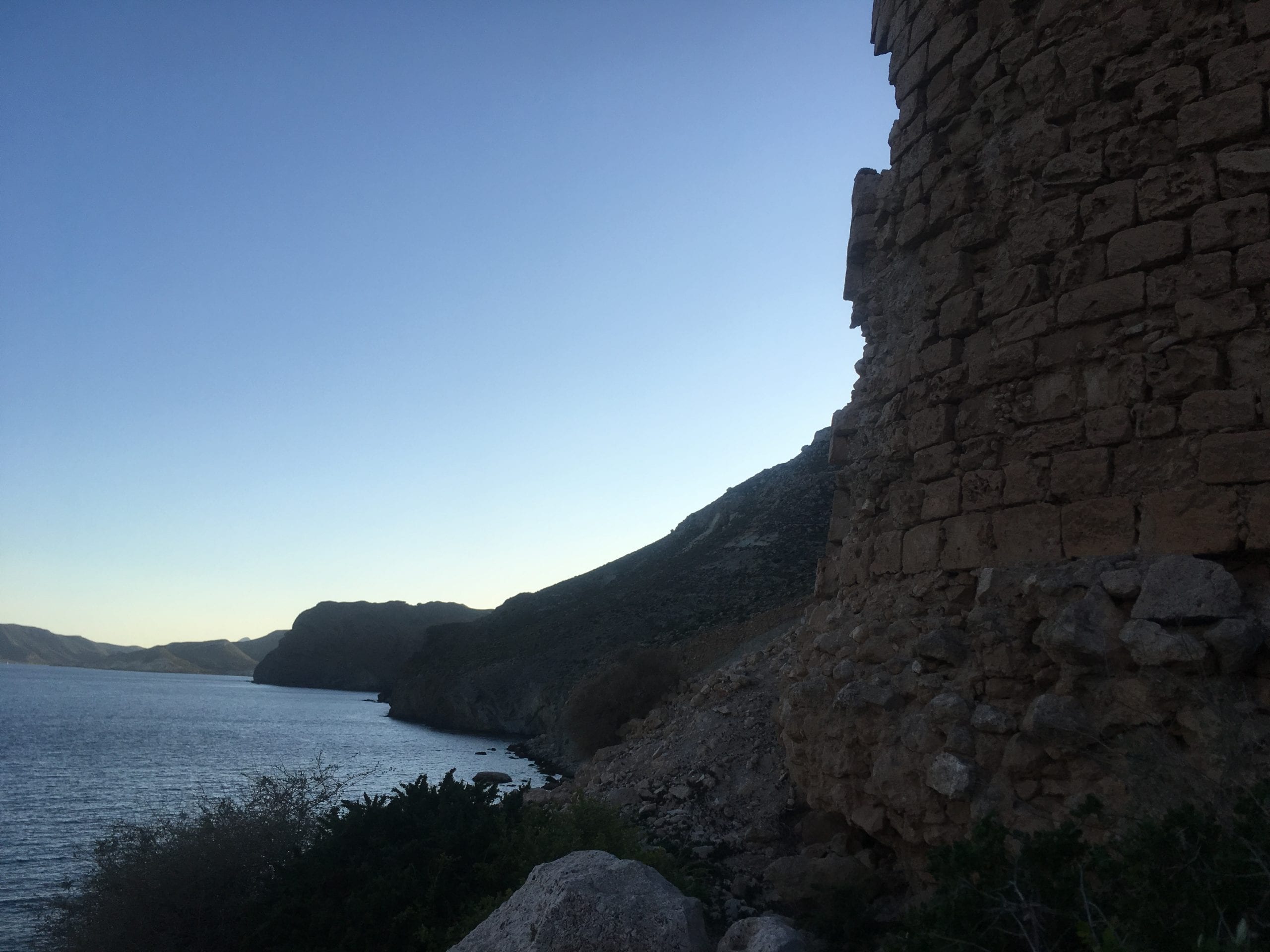
The selfie-shot footage shows them with orange lifevests strapped around their necks, cutting through the choppy waves on a white power boat. They are whooping, making a show for the viewer, the spray of the sea whipping their faces. The crossing has taken some time – it is still daylight in the videos. They explain they waited until nightfall to make landing and have been lost on the coast for hours. When it has sunk in, we say all we can think to say: “bienvenue, welcome to Europe!”
They press on us unwanted cigarettes as a thank you for the water. “Here, here, take two packs, they are good, Camels,” one of them says. We politely decline. Lotte and Jonas have given up buying fags. From time to time when desperate they will pilfer tobacco from butt ends on the road but besides, they say, they don’t like the taste of straights. Eventually, however, Jonas accepts the packets for the men are insistent, almost aggressive in wanting to prove they have something to offer of themselves.
All up and down this stretch of coast, things float over, not just migrants but huge parcels of drugs too
“Are there policia patrols on the road beyond the cliffs?” they ask.
We implore them to stay. The men are exhausted, running on adrenaline and little more, yet restless to keep moving: “Non, no, shukran, we must travel by night,” they say, eyes wide with the adventure.
They have a long road ahead of them, paperless, they need to avoid being picked up by the authorities as most of them want to get to France. Some have their sights on Germany, and Spain is just a stepping stone. To be picked up here meant staying in a country they did not share a language with and worse, the likelihood they would be deported straight back to North Africa.
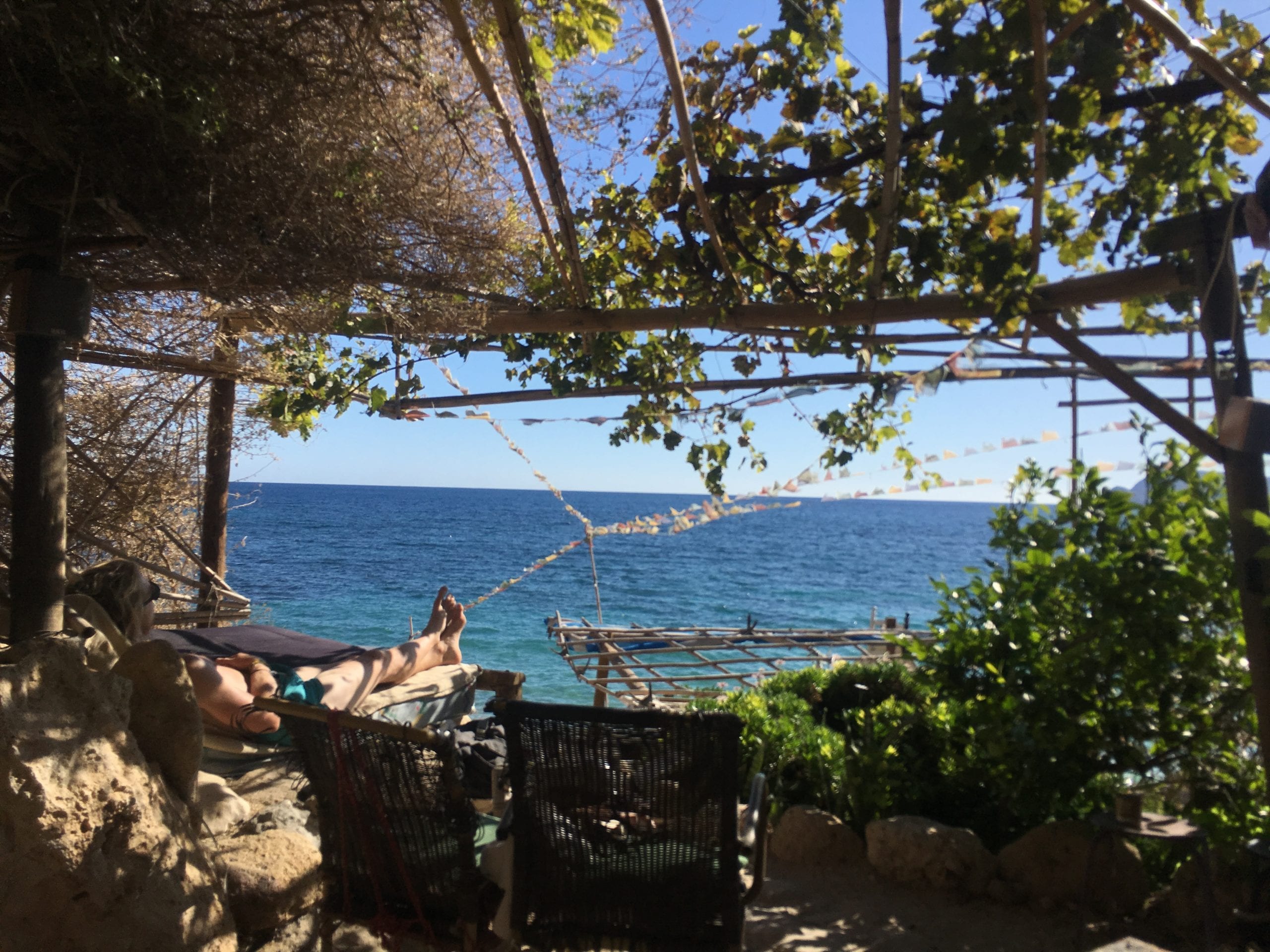
San Pedro lifers had told me that ‘the boatloads’ landed here “all the time”. One leathery resident, who wished to remain anonymous, said: “All up and down this stretch of coast, things float over, not just migrants but huge parcels of drugs too. The locals at the next village report these illicit exports to the local police. It’s not the migrants the police are after but the launches. I know for a fact that the boats – some of them worth €20,000 – get left over here and the policia sell them on.”
In 2018 Spain became the new gateway into Europe for undocumented migrants, overtaking Greece and Italy. The most recent data from Spain’s Interior Ministry suggest the authorities are succeeding in reducing trafficking. Arrivals have more than halved this year, largely owing to renewed efforts by Morocco to stop migrants setting off from its coastline. Yet that does not appear to be stopping the flow from Algeria. One out of every 100 migrants continues to die at sea. So far this year, 317 people have drowned in the Strait of Gibraltar.
There has been a loose hippy community on San Pedro for the last 30 years and the expats have a cosy relationship with the local policia. They told me that the policia come from all over to have barbeques on ‘their’ beach and when they are in civvies, everyone is friends. “They leave San Pedro untroubled because we do no harm. It’s a beautiful relationship,” one mellow resident had exhaled contentedly.
The men standing around our campfire cannot expect the same treatment. Almost 4,500 Algerians have been deported since 2013, thanks to bilateral agreements signed between the two countries. Their adrenaline had been infectious. It had crashed through the tranquility of the night, shattering the calm. But somehow, as the Algerians quietly dissolve into the night, so does this sense of urgency. “These men were rich,” sighs Lotte, holding up the cigarette packets to the glare of the fire. “It is not as if they were desperate refugees, fleeing some brutal war. They are just looking for the great capitalist dream, they are just greedy. And the sad fact is, it doesn’t even exist. They risk everything and for what?”
Before long they conversation drifts back to subjects including psychedelics and ‘higher consciousness’. Now the hammering of my heart has calmed down, I can once again hear the cicadas sing and I recall what an old Austrian had told me in the bar: “More and more they arrive. There are also more jellyfish than ever before – we keep a bottle of vinegar here for the tourists to treat the stings. Whether it is climate change or the plight of the desperate, the whole world is on the move, restless. Even here in San Pedro you can’t escape it.”
Click here to read more News from The Olive Press.



